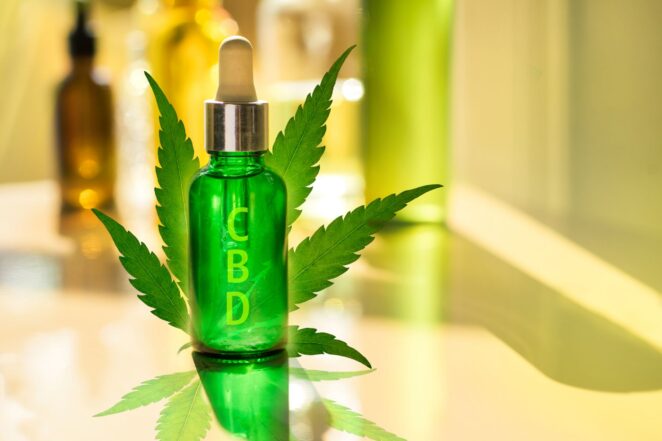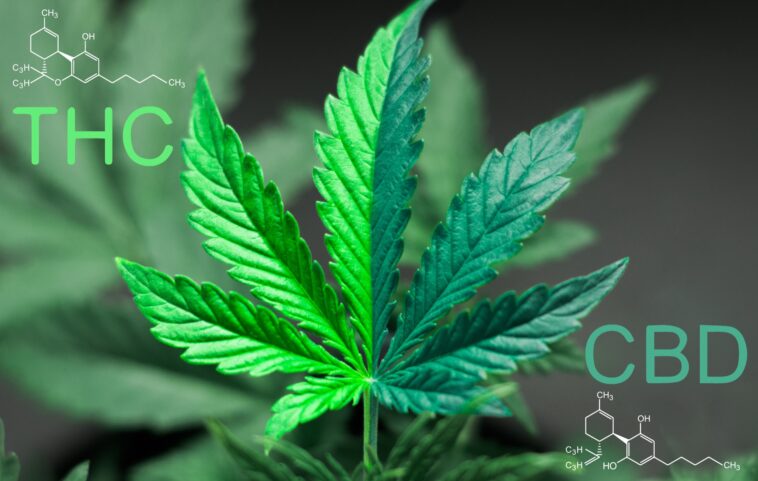Do you know that most health benefits of cannabis depend on two components – cannabidiol (CBD) and tetrahydrocannabinol (THC)? There’s a huge difference between them, and today we’ll talk about CBD. It does not produce a “high” or altered state of consciousness, unlike THC, and it’s commonly extracted from the hemp plant.
What is CBD?
CBD is one of the many cannabinoids – compounds, found in the cannabis plant. It is a non-psychoactive component, and it can be consumed in a form of oil, capsules, edibles, and topicals.
How does CBD work?
CBD interacts with the body’s endocannabinoid system (ECS), that’s responsible for maintaining balance in the body. The ECS consists of receptors found throughout the body, including in the brain, immune system, and organs. These receptors respond to CBD by regulating various bodily processes such as sleep, appetite, and pain sensation. CBD works by binding to specific receptors in the ECS, triggering a response in the body.
Potential Health Benefits of CBD

- Anxiety and depression: CBD has a positive effect on people with anxiety and depression by reducing the symptoms. Studies have found that CBD can interact with serotonin receptors in the brain, which can help regulate mood and reduce anxiety.
- Pain relief: CBD is known to have pain-relieving properties and has been used to treat chronic pain, arthritis, and multiple sclerosis. CBD works by interacting with receptors in the ECS that control pain perception and reducing inflammation.
- Epilepsy: CBD has been shown to reduce seizures in individuals with certain types of epilepsy, and the FDA has approved a CBD-based drug for this purpose. Studies have found that CBD can help reduce the frequency of seizures in individuals with certain types of epilepsy, such as Dravet syndrome and Lennox-Gastaut syndrome.
- Inflammation: CBD has anti-inflammatory properties and may be useful in treating conditions such as inflammatory bowel disease and rheumatoid arthritis. CBD works by reducing the production of inflammatory molecules and interacting with receptors in the ECS that control inflammation.
- Heart health: CBD may have a beneficial effect on heart health by reducing blood pressure and the risk of heart disease. Studies have found that CBD can help reduce hypertension and may protect against the development of heart disease.
- Cancer: Some studies have suggested that CBD may have anti-tumor effects and may be useful in treating certain types of cancer. CBD has been found to inhibit the growth of cancer cells and induce apoptosis, or cell death, in certain types of cancer.
- Substance abuse: CBD has been shown to have a positive effect on individuals with substance abuse disorders, by reducing symptoms of withdrawal and cravings. Studies have found that CBD can help reduce symptoms of withdrawal in individuals with substance abuse disorders such as opioid addiction and may also help reduce cravings for drugs such as cocaine and methamphetamine.
- Sleep: CBD has been found to have a positive effect on sleep by reducing insomnia and improving overall sleep quality. CBD works by interacting with receptors in the ECS that control sleep-wake cycles and by reducing anxiety and pain, which can interfere with sleep.
- Skincare: CBD has been found to have anti-aging properties and may be beneficial for treating various skin conditions such as eczema and psoriasis. CBD works by reducing inflammation and promoting cell growth, which can improve the overall appearance and health of the skin.
Safety and Legality

CBD is considered safe for most people and has a relatively low risk of side effects. However, CBD can interact with certain medications, so contact a healthcare professional before using CBD products, especially if you’re taking any medication.
It’s also important to note that while CBD derived from hemp is legal in most states, the legality of CBD can vary depending on the source and laws of your state or country. It’s always best to check the legal status of CBD in your area before purchasing or using any products.
Drug Interactions and Contraindications with CBD
Drug interactions and contraindications with CBD are important to understand before including it in any health regimen. Although CBD is non-psychoactive and generally safe, it can interact with certain medications such as antiepileptics, antihistamines, and antidepressants. Depending on the medication, these interactions could potentially lead to increased side effects or reduced effectiveness of the drug. Therefore, it’s recommended to speak to a doctor or healthcare professional prior to taking CBD if you’re on other medications. Additionally, there could be certain pre-existing conditions such as liver disease that make taking CBD dangerous. As always, one should consult their doctor before making any decisions about adding cannabinoids into their life.
Potential Side Effects of Using CBD Oil

CBD oil is generally considered safe, and there have been few reports of any major side effects. However, there are a few potential side effects to be aware of when using CBD oil:
-Nausea
-Diarrhea
-Changes in appetite
-Fatigue
-Headache or dizziness
Dry mouth or drylands
It’s important to keep in mind that everyone reacts differently to CBD oil and the dosage may vary depending on the individual. It’s best to start with a low dose and gradually increase it until you find one that works best for you. It’s important to consult your doctor before taking CBD if you are currently taking any other medications as some could interact with the cannabinoid.
Conclusion
CBD has a wide range of potential health benefits from reducing anxiety and depression to treating chronic pain. However, just like with any supplement or medication, it’s important to consult with a healthcare professional before starting to use CBD products and always be aware of the legal status of CBD in your area. So next time you plan to mail order weed, consider giving CBD products a try as well. With more research being conducted on the subject, it’s exciting to see what other potential benefits CBD can have in the future.




